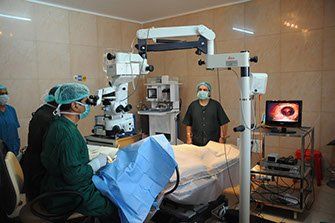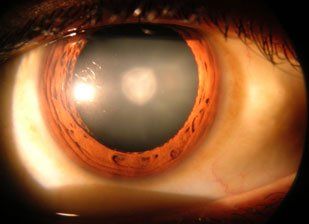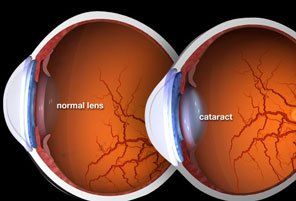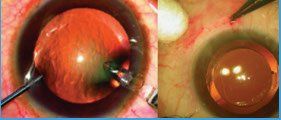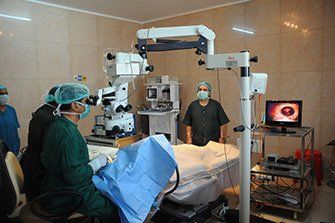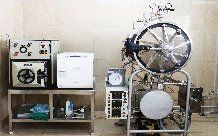MODERN CATARACT MICROSURGERY &
INTRAOCULAR LENS IMPLANTATION
CATARACT &
PHACO SURGERY IN BANGALORE
- WHAT IS CATARACT?
Our Eyes
Human eyes perform better than a modern digital camera. The cornea and crystalline lens focus an image on the retina. This high resolution image is transmitted to the brain through the optic nerves by a stream of micro electrical pulses. Good eyesight depends on the integrity of all these structures and functions.
What is Cataract?
- Cataract is the haziness of the crystalline lens of the eye. It causes scattering of light & blurring. It is not a layer that grows on the eye as many think.
- Vision in dim or bright light may get affected. Headlights may cause glare at night. Spectacle power may change frequently. Day to day activities, working with gadgets, using stairs etc., will be increasingly difficult. Reading may improve initially.
- It is best not to wait for cataract to mature as it can end up in complications. Except in special circumstances, a cataract surgery is performed when you cannot perform your day to day activities adequately and safely due to visual difficulties produced by the cataract. Many professions which demand very good eyesight may need an early surgery. However the natural lens, even with its slight imperfections of an early cataract, would have several advantages over the man made IOLs.
- Cataract does not cause pain, headache, redness or watering. The vision loss in cataract is always slow, and if you ever have rapid or sudden decrease in vision, it should be informed, as you may need specialized investigations to exclude other eye diseases.
- Cataract is common in middle age and in the elderly. It is also caused by drugs, chemicals, injuries, sun, UV light, radiation, electric shocks, malnutrition, diabetes, chronic diarrhea, X- rays, drugs etc. Viral infections during pregnancy, marriage within relatives, Genetic abnormalities etc. can cause cataracts in children.
Modern Micro-Surgery
Medicines, exercises, diet etc., cannot cure the cataract. Surgery is the only answer. It is the most often performed surgery on human beings.
- Recent advancements have made cataract microsurgery safe & painless. The stay in the hospital is only few hours. Recovery is quick and one can go back to routine work in few days. The advanced cataract surgery here includes:
- No injection, no pain, no bandage microsurgery
- Self-healing, no stitch tunnel incisions
- Central curvilinear capsulorhexis (CCC)
- Excellent endothelial protection with Visco-procedures
- Standard or premium (Aspherical, MICS, Toric & Multifocal) Intraocular lenses (IOLs)
- Presbyopia correction
- Safer surgeries for extremely complex & complicated situations
- The nucleus of the cataract is cleared either by MICS, Phacoemulsification or Phacosection, using ultrasound or hydro-manual procedures. The actual technique is chosen based on the type of your cataract, with equitable safety & results. With this approach, all types from immature to hyper mature cataracts can be safely scientifically approached. Those with diabetes, hypertension, cardiac diseases, cancer & on anticoagulants (blood thinners), Cortico-steroids, anti-metabolites etc. can undergo these micro surgeries. Do not stop the blood thinners
Karthik Netralaya offers you a very safe and advanced cataract microsurgery. Doctors are the first in Karnataka to introduce lOLs in 1981, ECCE in 1983, Phacoemulsification in 1991 & Phacosection in 1993. MICS was introduced in 1993 & Smart SMICS in 2016.
At Karthik Netralaya, you can choose to go through the futuristic "IOL Work Station" assessment & then select the most appropriate IOL to match your eye structure and your day to day visual needs. The latest OPD Scan III wavefront Aberrometry, Coneal asphericity, Pupillometry, Specular Microscopy, Optical / Ultrasound Biometry etc., are used to chose the IOL that maximises your vision. A person involved in outdoor activities & driving has different visual needs than a person busy with reading & computers. Similarly a Photographer or an artist has different visual needs than a Homemaker. The asphericity of your cornea can be matched with the asphericity of the IOL. You can also choose between better distance vs better near or intermediate vision. Further you could opt between maximising depth of field vs contrast. You can also mix and match IOLs with different parameters for your right and left eye, to further maximise the visual outcome. Today, a vast variety of all kinds of IOLs are available, and you could truly get the best out of the latest technology.
- THE INTRAOCULAR LENS (IOL)
The Intraocular Lens (IOL)
IOLs have seen tremendous advancements ever since Sir Harold Ridley introduced them in 1959. Your spectacle power can also be corrected by titrating IOL power with Optical or Immersion biometry. Today there are several options and an IOL is chosen based upon your visual needs and budget.
- Standard IOLs: vision in both eyes are corrected for either distance (outdoor, sports, professional driving), near (reading and computer work), or intermediate (cooking, arts & craft, desk work, multi-tasking, indoor activities).
- In Monovision correction the dominant eye is focused for distance and the other eye is focused for near or intermediate vision. This practical solution gives some spectacle independence.
- Premium blue blocking IOLs for daylight outdoor activity.
- Premium wavefront optimized asphercial IOLs for better contrast vision especially in dim light.
- Premium Toric IOLs to correct astigmatism. Other options are LRI, ASA and LASIK.
- Premium diffractive multifocal IOLs attempt to correct both distance and near sights, offering higher spectacle independence. They are today's solutions for Presbyopia. These IOLs cause some halos around lights and slightly lowered contrast sensitivity in dim light.
- Smart MSICS is a new concept aimed at extending depth of field, and spectacle independency may be achieved to a certain range.
- All IOLs block harmful UV light and protect the retina.
- Karthik Netralaya offers a wide range of IOLs made in India & abroad, meeting your required criteria.
- For those with very complex eye conditions, Bioptics with a combination of several techniques can be opted, to maximise possible visual recovery. Combination of Phacosurgery, LRI, Excimer LASER etc. could help in special situations.
Excellent cost effective IOLs are now made in India, including the premium IOLs. While the earlier IOLs were made of Poly-Methyl-Methacrylate (PMMA) and Silicone, today's foldable IOLs are made of Hydrophilic or Hydrophobic Acrylic material facilitating insertion through smaller incisions. Posterior Capsular Opacification (PCO) is less with Hydrophobic Acrylic IOLs.
- Complete the insurance formalities with our TPA Cell well in advance so as to obtain the pre-authorization from your Insurance Company.
- Fix up the date for Surgery & go through the Biometry, blood test, ECG, medical fitness tests, pre operative instructions, about 2 to 3 days before surgery bring the person who will attended to you at home.
- Bring your old medical records and all the medicines that you are currently taking.
- Do your routine work. Trim the nails of your fingers and toes and remove nail polish. Wash your hands and feet throughly.
- Use eye drops and medicines as advised.
- Continue all your earlier medications including those for diabetes, hypertension, cardiac problems, prostrate, blood thinners (Aspirin) etc.
- Wash your face with antiseptic soap for 5 minutes at night. Use washed towel, bedspread and pillow cover.
- Take head bath with shampoo and wash your face with soap for 5 minutes. Men could shave. Avoid cosmetics, hair oil and perfume. Use a sticker bindi instead of kumkum. Minimise jewellery.
- Continue eye drops and tablets.
- Have a light breakfast / lunch (3 bread slices / 3 idlis, 2 dosas or chapathis / light meal etc.) before leaving home. Carry some packed food with you.
- Diabetics: if you had your usual breakfast or lunch, take diabetic tablets and injections at your usual time. In case you are fasting, please avoid diabetic medicines till surgery or till you take your usual food. Carry some packed food with you.
- Hypertension, heart problems and other diseases: Continue your medicines as usual.
- Bring your medical records and medicines, a clean towel and a set of washed and ironed loose fitting front openable outer dress (shirt and pant / saree) packed in a new plastic carry-bag. Avoid tight T-shirts or kurthas.
- Bring a relative who attends to you at home. Avoid bringing children and many relatives and friends.
- Inform if you have any allergies or intolerance to any medicines or food (itching, rashes, nausea etc).
- Remove artificial teeth and dentures if they are loose. Remove contact lens from the other eye. You can wear them after surgery.
- At Karthik Netralaya eye drops will be instilled to dilate the pupil & to disinfect and numb the eye.
- Please visit the toilet just before entering the OT complex. Clean hands & wash your feet. You will be given alcohol rub to clean your hands.
- Please maintain cleanliness, sanctity and silence. Keep your mobiles in silent mode.
- You will walk out to meet your relatives with a smile! Receive post operative instructions along with your relative, who will attend to you at home. Do clarify every doubt. Follow the instructions meticulously. Do not take instructions from your friends and relatives.
- Don't touch your eyes. You would have some blurry vision for few days and it may be bluish for few weeks. The eye may be a little red and watering.
- Wipe tears on the cheek with a clean cloth. Don't wipe the eyes.
- Wear goggles or your old spectacles during the day and the eye shield at night for about a week. Use spectacles for one month in outdoors.
- Use tablets and eye drops as advised. Learn the exact method of using eye drops. Take a pain tablet if you have discomfort. Continue all your old medicines including blood thinners like Aspirin. Continue the eye drops that you are using for the other eye.
- There are no diet restrictions except those for Diabetes, Hypertension etc. Take wholesome food. Pulses, sprouts, vegetables are good and nourishing.
- Wash your face with soap with the eyes closed. Don't splash water with your eyes open. Shampoo your hair while taking headbath. Hair can be oiled and dyed. Men can shave.
- Resume your daily activities (cooking, office work, walking, driving, reading, TV, computers, prayers, washing clothes, cleaning and mopping, squatting, light Yoga, physical activities etc.,)
- Avoid playing with pets and children, strenuous physical work & yoga, contact sports, injuries, swimming, dust, wind and dental / ENT treatment for a month. Do not rub the eyes.
- You can see ordinary light but avoid directly viewing the sun.
- Stop smoking and using tobacco, it is bad for you, your family and the environment.
- Visit us for a check up on the next day & at 1 week and 1 month after the surgery. One of our Eye specialists will attend to you. If you have to travel out of Bangalore, please discuss with us about your visits. Visit us six months later & then once a year to maintain good eye health. Follow ups till one month are free.
- At one month, after a detailed check up, you would be prescribed distance & reading glasses. Use them whenever you need. Till then you can use your old spectacles or request for temporary spectacles for reading or driving.
- Those with Glaucoma, Diabetes & Retinal problems need periodic assessment and treatment.
- Karthik Netralaya is acknowledged to be a state-of-the-art Ophthalmic micro-surgical daycare center and is one of the best in its category. It is built with meticulous planning and dedication. It aims to achieve idealistic standards in eye care. Service, quality and innovation are the 3 facets incorporated into the fabric of its functioning.
- Professional skills and standards are constantly upgraded and also shared among professionals so that modern and safe technology is available to all.
- The tariffs are fixed, affordable and cost related.
- We remain eco friendly.
- Please generously gift your feedbacks & criticisms. They are valuable for our growth
- Cataract is the haziness of the crystalline lens of the eye. It causes scattering of light & blurring. It is not a layer that grows on the eye as many think.
- Vision in dim or bright light may get affected. Headlights may cause glare at night. Spectacle power may change frequently. Day to day activities, working with gadgets, using stairs etc., will be increasingly difficult. Reading may improve initially.
- It is best not to wait for cataract to mature as it can end up in complications. Except in special circumstances, a cataract surgery is performed when you cannot perform your day to day activities adequately and safely due to visual difficulties produced by the cataract. Many professions which demand very good eyesight may need an early surgery. However the natural lens, even with its slight imperfections of an early cataract, would have several advantages over the man made IOLs.
- Cataract does not cause pain, headache, redness or watering. The vision loss in cataract is always slow, and if you ever have rapid or sudden decrease in vision, it should be informed, as you may need specialized investigations to exclude other eye diseases.
- Cataract is common in middle age and in the elderly. It is also caused by drugs, chemicals, injuries, sun, UV light, radiation, electric shocks, malnutrition, diabetes, chronic diarrhea, X- rays, drugs etc. Viral infections during pregnancy, marriage within relatives, Genetic abnormalities etc. can cause cataracts in children.
- Recent advancements have made cataract microsurgery safe & painless. The stay in the hospital is only few hours. Recovery is quick and one can go back to routine work in few days. The advanced cataract surgery here includes:
- No injection, no pain, no bandage microsurgery
- Self-healing, no stitch tunnel incisions
- Central curvilinear capsulorhexis (CCC)
- Excellent endothelial protection with Visco-procedures
- Standard or premium (Aspherical, MICS, Toric & Multifocal) Intraocular lenses (IOLs)
- Presbyopia correction
- Safer surgeries for extremely complex & complicated situations
- The nucleus of the cataract is cleared either by MICS, Phacoemulsification or Phacosection, using ultrasound or hydro-manual procedures. The actual technique is chosen based on the type of your cataract, with equitable safety & results. With this approach, all types from immature to hyper mature cataracts can be safely scientifically approached. Those with diabetes, hypertension, cardiac diseases, cancer & on anticoagulants (blood thinners), Cortico-steroids, anti-metabolites etc. can undergo these micro surgeries. Do not stop the blood thinners.
- Standard IOLs: vision in both eyes are corrected for either distance (outdoor, sports, professional driving), near (reading and computer work), or intermediate (cooking, arts & craft, desk work, multi-tasking, indoor activities).
- In Monovision correction the dominant eye is focused for distance and the other eye is focused for near or intermediate vision. This practical solution gives some spectacle independence.
- Premium blue blocking IOLs for daylight outdoor activity.
- Premium wavefront optimized asphercial IOLs for better contrast vision especially in dim light.
- Premium Toric IOLs to correct astigmatism. Other options are LRI, ASA and LASIK.
- Premium diffractive multifocal IOLs attempt to correct both distance and near sights, offering higher spectacle independence. They are today's solutions for Presbyopia. These IOLs cause some halos around lights and slightly lowered contrast sensitivity in dim light.
- Smart MSICS is a new concept aimed at extending depth of field, and spectacle independency may be achieved to a certain range.
- All IOLs block harmful UV light and protect the retina.
- Karthik Netralaya offers a wide range of IOLs made in India & abroad, meeting your required criteria.
- For those with very complex eye conditions, Bioptics with a combination of several techniques can be opted, to maximise possible visual recovery. Combination of Phacosurgery, LRI, Excimer LASER etc. could help in special situations.
- Complete the insurance formalities with our TPA Cell well in advance so as to obtain the pre-authorization from your Insurance Company.
- Fix up the date for Surgery & go through the Biometry, blood test, ECG, medical fitness tests, pre operative instructions, about 2 to 3 days before surgery bring the person who will attended to you at home.
- Bring your old medical records and all the medicines that you are currently taking.
- Do your routine work. Trim the nails of your fingers and toes and remove nail polish. Wash your hands and feet throughly.
- Use eye drops and medicines as advised.
- Continue all your earlier medications including those for diabetes, hypertension, cardiac problems, prostrate, blood thinners (Aspirin) etc.
- Wash your face with antiseptic soap for 5 minutes at night. Use washed towel, bedspread and pillow cover.
- Take head bath with shampoo and wash your face with soap for 5 minutes. Men could shave. Avoid cosmetics, hair oil and perfume. Use a sticker bindi instead of kumkum. Minimise jewellery.
- Continue eye drops and tablets.
- Have a light breakfast / lunch (3 bread slices / 3 idlis, 2 dosas or chapathis / light meal etc.) before leaving home. Carry some packed food with you.
- Diabetics: if you had your usual breakfast or lunch, take diabetic tablets and injections at your usual time. In case you are fasting, please avoid diabetic medicines till surgery or till you take your usual food. Carry some packed food with you.
- Hypertension, heart problems and other diseases: Continue your medicines as usual.
- Bring your medical records and medicines, a clean towel and a set of washed and ironed loose fitting front openable outer dress (shirt and pant / saree) packed in a new plastic carry-bag. Avoid tight T-shirts or kurthas.
- Bring a relative who attends to you at home. Avoid bringing children and many relatives and friends.
- Inform if you have any allergies or intolerance to any medicines or food (itching, rashes, nausea etc).
- Remove artificial teeth and dentures if they are loose. Remove contact lens from the other eye. You can wear them after surgery.
- At Karthik Netralaya eye drops will be instilled to dilate the pupil & to disinfect and numb the eye.
- Please visit the toilet just before entering the OT complex. Clean hands & wash your feet. You will be given alcohol rub to clean your hands.
- Please maintain cleanliness, sanctity and silence. Keep your mobiles in silent mode.
- Sophisticated equipments are used in our modern, clean, & vaastu designed, NABH accredited operation theatres. HEPA fan filter units (FFUs), dehumidifiers, negative ion emitters, UV lights, modern B class autoclave with Nano-controller (multiple pre-vacuum and post dry cycles with graphic monitor), Ethylene oxide sterilizer, central water treatment plant and many other features make the procedures in our operation theaters safe.
- Strict aseptic protocols are meticulously followed. Each surgery is completely isolated from others and nothing is transferred from one surgery to the next without a proper sterilisation protocol.
- Quality medicines, supplies and disposables are purchased in bulk from renowned manufacturers and stored hygienically. This adds to the safety, saves costs and minimises transport / storage related contaminations.
- The Anesthesiologist will monitor your health during the surgery. Surgery will be painless. Please remain calm & quiet during the surgery. You can move your arms and legs, change your position, cough or sneeze, but talk to the surgeon before doing so. Listen & carefully follow surgeon's instructions. Wear your hearing aids, if you are using them. Keep both your eyes open through out the surgery.
- You will walk out to meet your relatives with a smile! Receive post operative instructions along with your relative, who will attend to you at home. Do clarify every doubt. Follow the instructions meticulously. Do not take instructions from your friends and relatives.
- Don't touch your eyes. You would have some blurry vision for few days and it may be bluish for few weeks. The eye may be a little red and watering.
- Wipe tears on the cheek with a clean cloth. Don't wipe the eyes.
- Wear goggles or your old spectacles during the day and the eye shield at night for about a week. Use spectacles for one month in outdoors.
- Use tablets and eye drops as advised. Learn the exact method of using eye drops. Take a pain tablet if you have discomfort. Continue all your old medicines including blood thinners like Aspirin. Continue the eye drops that you are using for the other eye.
- There are no diet restrictions except those for Diabetes, Hypertension etc. Take wholesome food. Pulses, sprouts, vegetables are good and nourishing.
- Wash your face with soap with the eyes closed. Don't splash water with your eyes open. Shampoo your hair while taking headbath. Hair can be oiled and dyed. Men can shave.
- Resume your daily activities (cooking, office work, walking, driving, reading, TV, computers, prayers, washing clothes, cleaning and mopping, squatting, light Yoga, physical activities etc.,)
- Avoid playing with pets and children, strenuous physical work & yoga, contact sports, injuries, swimming, dust, wind and dental / ENT treatment for a month. Do not rub the eyes.
- You can see ordinary light but avoid directly viewing the sun.
- Stop smoking and using tobacco, it is bad for you, your family and the environment.
- Visit us for a check up on the next day & at 1 week and 1 month after the surgery. One of our Eye specialists will attend to you. If you have to travel out of Bangalore, please discuss with us about your visits. Visit us six months later & then once a year to maintain good eye health. Follow ups till one month are free.
- At one month, after a detailed check up, you would be prescribed distance & reading glasses. Use them whenever you need. Till then you can use your old spectacles or request for temporary spectacles for reading or driving.
- Those with Glaucoma, Diabetes & Retinal problems need periodic assessment and treatment.
- Rarely the visual recovery may not be as expected. This may be due to pre-existing diseases like amblyopia, glaucoma, optic atrophy, retinal detachment, diabetic retinopathy, eclipse / myopic / age related and other macular/retinal degenerations, injuries, hereditary diseases etc. Due to the cataract, they could not have been adequately diagnosed or quantified before the surgery.
- Report immediately if there is increasing redness, watering, irritation, pain, swelling, blurring, floaters, flashes, photophobia, intolerance to light, yellow discharge etc.
- Every surgery has its risks. Inspite of an excellent set up, care & precision, deviations can rarely occur during & after the surgery. This could result in delayed, insufficient or absent visual recovery or even permanent loss of eye structure & function. Additional treatment or surgeries may be needed. Surgeon may not be able to complete the procedure or may decide to deviate & perform different on additional procedures in the best interest of patient's eye and health. Conditions that were not expected before may crop up during surgery, and the Surgeon may decide to take up reparative procedures, without discussing with patient or family. There could be additional treatments and expenses involved.
- Karthik Netralaya is acknowledged to be a state-of-the-art Ophthalmic micro-surgical daycare center and is one of the best in its category. It is built with meticulous planning and dedication. It aims to achieve idealistic standards in eye care. Service, quality and innovation are the 3 facets incorporated into the fabric of its functioning.
- Professional skills and standards are constantly upgraded and also shared among professionals so that modern and safe technology is available to all.
- The tariffs are fixed, affordable and cost related.
- We remain eco friendly.
- Please generously gift your feedbacks & criticisms. They are valuable for our growth

- Mr. Harish K Raju
My heartfelt & special thanks to Dr Ravindra and his whole family, team members. Way back in 1983-1986 my mother, Smt. Vanakajshi underwent 1 successful Cornea Transplant surgery & 3 Cataract successive surgeries all done by Dr Ravindra ji. In those days we did not have any reliable doctors to our access in Bangalore and Dr Ravindra came to our rescue; In our desperate situations, Dr Ravindra filled hope and showed light to My Mother and thereby to our whole Family! A million thanks to Dr Ravindra sir!!! God Bless him and his whole team!!
YesSuits
- Gaurav Nilakantan
This is Gaurav Nilakantan, your US patient with recurring corneal erosion. My mom Nirmala Nilakantan recently had cataract surgery with you. She told me that she mentioned my dissertation award to you... Doctor as always I am indebted to you for healing my eyes.... I also acknowledged you in my dissertation because I could not have done it without your help. My eyes are doing very well now. I have not had any major incident for a while now. I am making sure to get good sleep, put ointment, and avoid late night work. Thank you for doing a great job with my mom's surgery, I was calm sitting here in the US knowing she was in good hands. I am coming in Dec to Bangalore and will drop by to see you. Best regards,
Button
- Dr. P. S. Vijay Kumar
It gives me great pleasure to wish you, your family and your staff a Happy New Year 2011 and a Happy Sankranthi. You did cataract surgery on my right eye on December 1st and on my left eye on December 6th of last year. I am happy to report that both eyes are doing great. I have taken the liberty to inform you that I am truly impressed with your Karthik Netralaya based on my short visit. You have good staff in front and back offices. I liked the professional and friendly way I was treated by your medical staff. You have an elegant and clean facility with a nice decor. I will be happy to recommend this to my friends in Tucson. Arizona, USA.
Button
- Deepak Menon
I belong to Dehradun and was in Bangalore visiting an Aunt Mrs. K Radha and her family, and since she is quite aged, with eye problems, I and her daughter brought her to your institution for a checkup. At the very outset - we visited your institute thrice and each time the auto rickshaw driver we hired, knew the exact location to your institute though we traveled from Srinagara which is very far away - this speaks volumes for your reputation.
Your entire staff was extremely courteous and they all gave my Aunt very personal attention right from the
The doctors were attentive, listened carefully, performed the Cataract Operation without any anesthesia which again is a credit to them since they succeeded in keeping the patient calm and without fears.
I think she has had some of the most professional and best care and treatment anywhere - so I must thank you and your team and wish you all the best success.
I am an author based in Dehradun/ Delhi and should you visit, so write me and be our guest.
Button
- Google review (Mr. Mahesh Nagarajan)
My personal experience with the service I recieved at Karthik Nethralaya was great.My check ups were thoroughly carried out by the doctors and the lasik procedure went really well as explained. It is still early days for me to comment on my recovery of eyes.
Button
- Google review (Mr. Mahendra Kumar P)
I had a lasik with contoura vision at Karthik Netralaya. For last 2 years, wanted to perform lasik and luckily my power (-6.25) was constant for one year. Finally was able to find the right institution - Karthik netralaya through one of my friend. They have excellent procedural systems and top quality team. The starting check ups and advice to lasik is very good. Dr. M S Ravindra did my vision correction and is absolutely brilliant. Anyone thinking of lasik - Dr M S Ravindra and his team at Karthik netralaya is the place to go. After the correction, I am having no issues and it’s excellent experience of vision which I am enjoying now. Very happy and satisfied with the my decision. Last but not the least, very supportive staff team at the institution. Thank you.
Button
- Lakshmi
I am Lakshmi and I work for IBM as senior software engineer. I tried to locate the best laser treatment in Bangalore and I got this reference from my CHN eye doctor. Upon further enquiry I found that most of my colleagues got LASIK done with the same clinic. I got my LASIK done at Karthik Netralaya, Bangalore in 2010. I was very much scared of the procedure before I approached them. The doctor was very very kind enough to explain me the procedure. His patience levels are very high and he made me very comfortable through-out the procedure. My overall experience with Karthik Netralaya is EXCELLENT. Thank you doctor and your whole team!
Button
ASK US
We will get back to you as soon as possible.
Please try again later.
